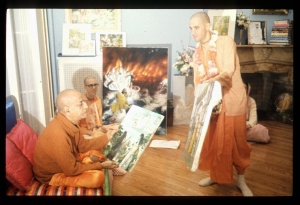CC Madhya 8.248

A.C. Bhaktivedanta Swami Prabhupada
TEXT 248
‘duḥkha-madhye kona duḥkha haya gurutara?’
‘kṛṣṇa-bhakta-viraha vinā duḥkha nāhi dekhi para’
SYNONYMS
duḥkha-madhye—among the miserable conditions of life; kona—what; duḥkha—misery; haya—is; gurutara—more painful; kṛṣṇa-bhakta-viraha—separation from the devotee of Lord Kṛṣṇa; vinā—besides; duḥkha—unhappiness; nāhi—there is not; dekhi—I see; para—other.
TRANSLATION
Śrī Caitanya Mahāprabhu asked, “Of all kinds of distress, what is the most painful?” Śrī Rāmānanda Rāya replied, “Apart from separation from the devotee of Kṛṣṇa, I know of no unbearable unhappiness.”
PURPORT
Concerning this, the Lord states in the Vedic literature:
- mām anārādhya duḥkhārtaḥ kuṭumbāsakta-mānasaḥ
- sat-saṅga-rahito martyo vṛddha-sevā-paricyutaḥ
“A person who does not worship Me, who is unduly attached to family and who does not stick to devotional service must be considered a most unhappy person. Similarly, one who does not associate with Vaiṣṇavas, or who does not render service to his superior, is also a most unhappy person.” There is also the following statement in the Bṛhad-bhāgavatāmṛta (1.5.44):
- sva-jīvanādhikaṁ prārthyaṁ śrī-viṣṇu-jana-saṅgataḥ
- vicchedena kṣaṇaṁ cātra na sukhāṁśaṁ labhāmahe
“Out of all kinds of desirable things experienced in the life of a living entity, association with the devotees of the Lord is the greatest. When we are separated from a devotee even for a moment, we cannot enjoy happiness.”